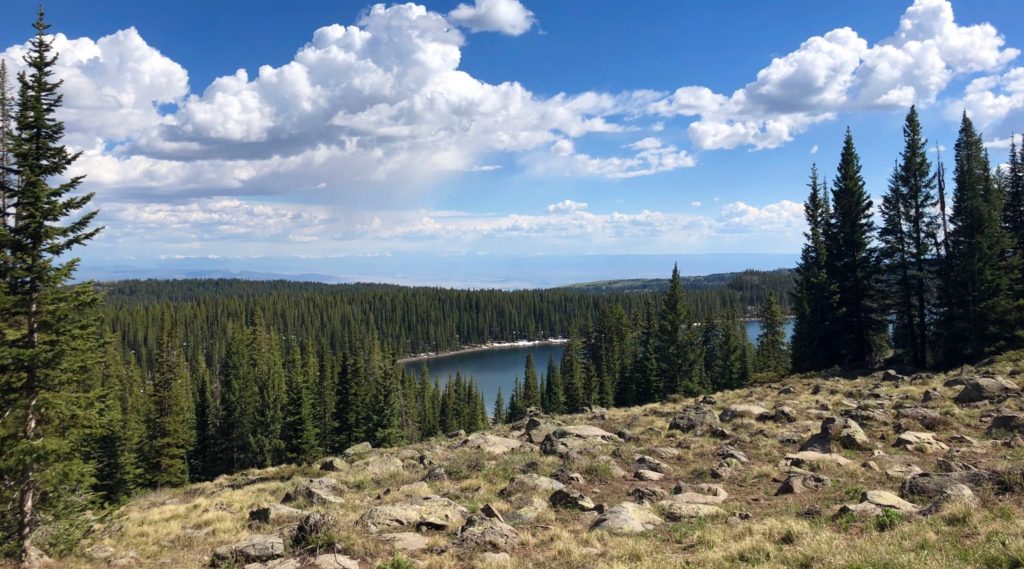Opinion: Love, Justice, And Climate Change. Climate Anxiety And Having A Good Life

Western slopes of the Rocky Mountains in Colorado. Photo: Russ Vernon-Jones

If you feel anxious about the climate situation, you have lots of company. Virtually everyone has some anxiety about the mess we are in with climate change, whether they want to face it or not. Google searches for “climate anxiety” went up 565% last year. A recent poll found 70% of U.S.ers are worried about climate change.
I’m going to say some unpleasant things in this post, but I promise some useful, more auspicious, perspectives and suggestions before the end, if you can get that far.
Things Are Bad
It’s quite natural to feel some anxiety in this situation. Climate change is already causing deadly storms, fires, heat waves, drought, excessive rain, agricultural crop failures, and rising sea levels– dislocating millions of people from their homes each year. The worst effects have been in poorer, less-developed nations, populated primarily by Global Majority and Indigenous people. And recently, wealthy nations like the U.S. have been experiencing more catastrophic effects from the destabilized climate (Global Majority” is a term for people often referred to a “people of color.” See here for a fuller explanation of “GMI” or “Global Majority and Indigenous.”)
If you’ve been following the climate situation, you know that things are bad and that even under the best-case scenario they are going to get worse–everywhere. Yikes! Even if we already know that’s true, it’s a shocking statement to say that things are going to get worse. (Aren’t things bad enough already? Is anyone thinking … COVID pandemic, rising authoritarianism, racism, economic inequality, financial insecurity?)
How Do We Manage Our Feelings In This Situation? What’s A Healthy Emotional Response?
I’ve spent a lot of time thinking and reading about climate anxiety–leading groups, listening to people, and creating safe spaces for people to have their feelings about the climate crisis — to feel them, to share them, to accept them. Here’s some of what I’ve learned.
- It’s useful to try to face reality. Any other approach undermines our integrity, disconnects us, is likely to increase addictions, and usually leaves us vaguely anxious that reality will catch up with us sooner or later.
Facing Reality
Facing reality is a big ask right now. Not only is the climate crisis going to get worse, it isn’t going to end in our lifetimes. (Even if we were to stop all greenhouse gas emissions tomorrow (which we are far from doing) the CO2 already in the atmosphere has a delayed effect which will continue to make things worse for at least the next 30 years, with it continuing to be a major problem throughout the century and beyond. Some people think we are all about to die from climate change. However, in the developed nations, most of us are going to be around until something else kills us–as the suffering and devastation from climate change increases, both in the U.S. and around the world.)
We cannot hold our breath, grit our teeth, or put our heads in the sand until the climate crisis is over. So, it’s going to be important for us all to find meaningful, connected, effective ways to live in the midst of this ongoing challenge.
Not Everything Is Bad
Facing reality, of course, does not just mean looking at the climate emergency at every moment. Reality includes the beauty in the natural world around us, the joy of friendships, the pleasures of food, and art, and exercise. We get to look at all of reality and enjoy the best of it, without ignoring the climate emergency.
- It’s useful to accept that we have feelings about the climate situation. We get to notice them and feel them. The burden of them will lighten if we can get other people to listen caringly as we talk about them. It will lighten even more if we are able to release them in tears, trembling, or even laughing. Many people and groups are finding that this is feasible in listening exchanges and support groups.
Feelings We’ve Felt Before
Some of our feelings are about climate change. But climate change also brings to the fore stored painful feelings we have from much earlier in our lives. As very young children, virtually all of us had experiences of feeling overwhelmed, on our own, and/or unable to do anything about things that were wrong. We had to put those feelings away and go on about our lives.
Now, the climate crisis is leading us to feel them again. (Or perhaps we have felt them throughout our lives and now we are feeling them in connection with climate change.) We often feel as powerless as we were when we were very young. It’s hard for us to tell that things actually are quite different now. Despite those feelings, we now are capable of joining with others to impact the world around us in ways that we weren’t able to when we were little.
It Is What iI Is
I often feel that I want things in the world to be different. I’m upset that they aren’t different. Sometimes I feel that I’m going to be miserable until things in the world change. Sooner or later, I come to my senses and realize that I don’t want to live that way. I don’t want climate change or racism to determine my personal feelings all the time. I want to take charge of my own life and choose a more hopeful attitude that moves me toward action and connection with other people. At least for now, the climate situation is what it is. It is what it is–I don’t like it–what am I going to do about it–and who am I going to do it with?
- It’s useful to get engaged with other people and do some things to help stop the climate crisis. I’ve made new friends and found comradeship, and sometimes joy, in working with others to try to stop new pipelines; pass legislation; organize rallies; advocate for divestment; protect local forests; teach about racism; bring new people into the movement; and support each other to learn, feel our feelings, and keep going. Taking action is among the key recommendations from clinical psychologists for addressing climate anxiety.
Hope And Action
As Greta Thunberg says, “Once we start to act, hope is everywhere. So instead of looking for hope, look for action. Then, and only then, hope will come.”
Enjoy Being Alive
Just last week, Danielle, a friend of mine, said to me, “Climate change scares me, but today is a beautiful day and I’m going to enjoy being alive. I’ve already scheduled a meeting next week with Joseph (another friend) to plan our next steps on climate.” I think Danielle, and this short statement of hers, can be a model for all of us. Like Danielle we can:
- Face climate reality
- Acknowledge our feelings and tell other people about them
- Connect with other people around climate
- Do something to help stop the crisis–both individually and with others
- Enjoy being alive
Russ Vernon-Jones was principal of Fort River School 1990-2008 and is currently a member of the Amherst Community Safety Working Group and of the Steering Committee of Climate Action Now-Western Massachusetts. He blogs regularly on climate justice at www.russvernonjones.org.
